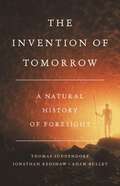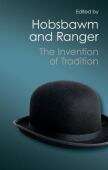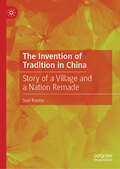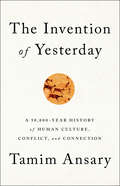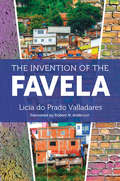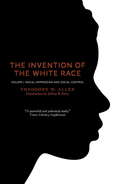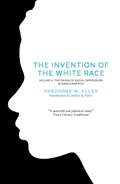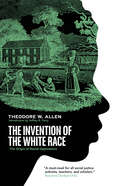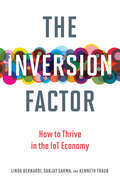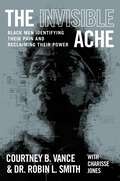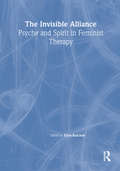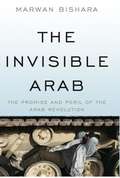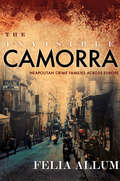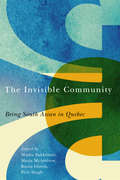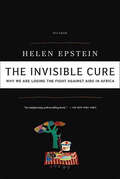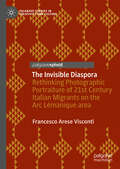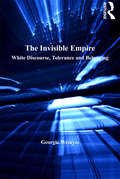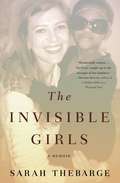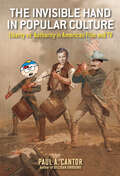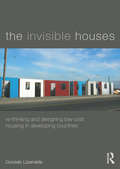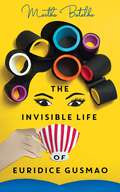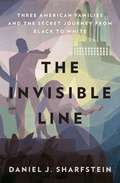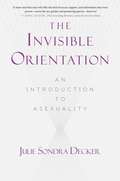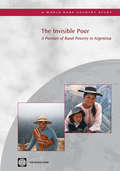- Table View
- List View
The Invention of Tomorrow: A Natural History of Foresight
by Thomas Suddendorf Jonathan Redshaw Adam BulleyA spellbinding exploration of the human capacity to imagine the future Our ability to think about the future is one of the most powerful tools at our disposal. In The Invention of Tomorrow, cognitive scientists Thomas Suddendorf, Jonathan Redshaw, and Adam Bulley argue that its emergence transformed humans from unremarkable primates to creatures that hold the destiny of the planet in their hands. Drawing on their own cutting-edge research, the authors break down the science of foresight, showing us where it comes from, how it works, and how it made our world. Journeying through biology, psychology, history, and culture, they show that thinking ahead is at the heart of human nature—even if we often get it terribly wrong. Incisive and expansive, The Invention of Tomorrow offers a fresh perspective on the human tale that shows how our species clawed its way to control the future.
The Invention of Tradition
by Eric Hobsbawm Terence RangerMany of the traditions which we think of as very ancient in their origins were not in fact sanctioned by long usage over the centuries, but were invented comparatively recently. This book explores examples of this process of invention – the creation of Welsh and Scottish 'national culture'; the elaboration of British royal rituals in the nineteenth and twentieth centuries; the origins of imperial rituals in British India and Africa; and the attempts by radical movements to develop counter-traditions of their own. It addresses the complex interaction of past and present, bringing together historians and anthropologists in a fascinating study of ritual and symbolism which poses new questions for the understanding of our history.
The Invention of Tradition in China: Story of a Village and a Nation Remade
by Suvi RautioIn China, heritage projects are sprouting across the countryside carrying the promise of Xi Jinping’s “Chinese dream” as a call for the great revival and rejuvenation of the nation. This book unravels the workings behind these promises through the story of remaking Meili, a Dong ethnic minority village nestled along the margins of China, into a “Traditional Village” heritage site. In a past riven by deep political and societal disruptions, Meili becomes a medium for contesting, mediating and continuously inventing representations of tradition that aligns with the Chinese Communist Party’s mission towards continuity and stability. The outcome is an original depiction of the compromises that shape heritage-making in a rural ethnic corner of China. Filled with rich, fine-grained narrative and analysis, Suvi Rautio offers a unique lens to the politics of inventing tradition and its far-reaching consequences in steering China's national identity under Xi Jinping rule.
The Invention of Yesterday: A 50,000-Year History of Human Culture, Conflict, and Connection
by Tamim AnsaryFrom language to culture to cultural collision: the story of how humans invented history, from the Stone Age to the Virtual AgeTraveling across millennia, weaving the experiences and world views of cultures both extinct and extant, The Invention of Yesterday shows that the engine of history is not so much heroic (battles won), geographic (farmers thrive), or anthropogenic (humans change the planet) as it is narrative.Many thousands of years ago, when we existed only as countless small autonomous bands of hunter-gatherers widely distributed through the wilderness, we began inventing stories--to organize for survival, to find purpose and meaning, to explain the unfathomable. Ultimately these became the basis for empires, civilizations, and cultures. And when various narratives began to collide and overlap, the encounters produced everything from confusion, chaos, and war to cultural efflorescence, religious awakenings, and intellectual breakthroughs.Through vivid stories studded with insights, Tamim Ansary illuminates the world-historical consequences of the unique human capacity to invent and communicate abstract ideas. In doing so, he also explains our ever-more-intertwined present: the narratives now shaping us, the reasons we still battle one another, and the future we may yet create.
The Invention of the Favela (Latin America in Translation/en Traducción/em Tradução)
by Licia do ValladaresFor the first time available in English, Licia do Prado Valladares's classic anthropological study of Brazil's vast, densely populated urban living environments reveals how the idea of the favela became an internationally established—and even attractive and exotic—representation of poverty. The study traces how the term "favela" emerged as an analytic category beginning in the mid-1960s, showing how it became the object of immense popular debate and sustained social science research. But the concept of the favela so favored by social scientists is not, Valladares argues, a straightforward reflection of its social reality, and it often obscures more than it reveals.The established representation of favelas undercuts more complex, accurate, and historicized explanations of Brazilian development. It marks and perpetuates favelas as zones of exception rather than as integral to Brazil's modernization over the past century. And it has had important repercussions for the direction of research and policy affecting the lives of millions of Brazilians. Valladares's foundational book will be welcomed by all who seek to understand Brazil's evolution into the twenty-first century.
The Invention of the White Race, Volume 1
by Jeffrey B. Perry Theodore W. AllenWhen the first Africans arrived in Virginia in 1619, there were no "white" people there. Nor, according to colonial records, would there be for another sixty years. In this seminal two-volume work, The Invention of the White Race, Theodore W. Allen tells the story of how America's ruling classes created the category of the "white race" as a means of social control. Since that early invention, white privileges have enforced the myth of racial superiority, and that fact has been central to maintaining ruling-class domination over ordinary working people of all colors throughout American history.Volume I draws lessons from Irish history, comparing British rule in Ireland with the "white" oppression of Native Americans and African Americans. Allen details how Irish immigrants fleeing persecution learned to spread racial oppression in their adoptive country as part of white America.Since publication in the mid-nineties, The Invention of the White Race has become indispensable in debates on the origins of racial oppression in America. In this updated edition, scholar Jeffrey B. Perry provides a new introduction, a short biography of the author and a study guide.From the Trade Paperback edition.
The Invention of the White Race, Volume 2
by Jeffrey B. Perry Theodore W. AllenOn the steps of the Lincoln Memorial in 1963, Martin Luther King outlined a dream of an America where people would not be judged by the color of their skin. That dream has yet to be realized, but some three centuries ago it was a reality. Back then, neither social practice nor law recognized any special privileges in connection with being white. But by the early decades of the eighteenth century, that had all changed. Racial oppression became the norm in the plantation colonies, and African Americans suffered under its yoke for more than two hundred years.In Volume II of The Invention of the White Race, Theodore Allen explores the transformation that turned African bond-laborers into slaves and segregated them from their fellow proletarians of European origin. In response to labor unrest, where solidarities were not determined by skin color, the plantation bourgeoisie sought to construct a buffer of poor whites, whose new racial identity would protect them from the enslavement visited upon African Americans. This was the invention of the white race, an act of cruel ingenuity that haunts America to this day.Allen's acclaimed study has become indispensable in debates on the origins of racial oppression in America. In this updated edition, scholar Jeffrey B. Perry provides a new introduction, a select bibliography and a study guide.From the Trade Paperback edition.
The Invention of the White Race: The Origin of Racial Oppression (The\invention Of The White Race Ser. #1)
by Theodore W. AllenWhen the first Africans arrived in Virginia in 1619, there were no &“white&” people there; nor, according to colonial records, would there be for another sixty years. Historical debate about the origin of racial slavery has focused on the status of the Negro in seventeenth-century Virginia and Maryland. However, as Theodore W. Allen argues in this magisterial work, what needs to be studied is the transformation of English, Scottish, Irish and other European colonists from their various statuses as servants, tenants, planters or merchants into a single new all-inclusive status: that of whites. This is the key to the paradox of American history, of a democracy resting on race assumptions.Volume One of this two-volume work attempts to escape the &“white blind spot&” which has distorted consecutive studies of the issue. It does so by looking in the mirror of Irish history for a definition of racial oppression and for an explanation of that phenomenon in terms of social control, free from the absurdities of classification by skin color. Compelling analogies are presented between the history of Anglo-Irish and British rule in Ireland and American White Supremacist oppression of Indians and African-Americans. But the relativity of race is shown in the sea change it entailed, whereby emigrating Irish haters of racial oppression were transformed into White Americans who defended it. The reasons for the differing outcomes of Catholic Emancipation and Negro Emancipation are considered and occasion is made to demonstrate Allen&’s distinction between racial and national oppression.
The Inversion Factor: How to Thrive in the IoT Economy (The\mit Press Ser.)
by Linda Bernardi Sanjay E. Sarma Kenneth TraubWhy companies need to move away from a “product first” orientation to pursuing innovation based on customer need.In the past, companies found success with a product-first orientation; they made a thing that did a thing. The Inversion Factor explains why the companies of today and tomorrow will have to abandon the product-first orientation. Rather than asking “How do the products we make meet customer needs?” companies should ask “How can technology help us reimagine and fill a need?” Zipcar, for example, instead of developing another vehicle for moving people from point A to point B, reimagined how people interacted with vehicles. Zipcar inverted the traditional car company mission. The authors explain how the introduction of “smart” objects connected by the Internet of Things signals fundamental changes for business. The IoT, where real and digital coexist, is powering new ways to meet human needs. Companies that know this include giants like Amazon, Airbnb, Uber, Google, Tesla, and Apple, as well as less famous companies like Tile, Visenti, and Augury. The Inversion Factor offers a roadmap for businesses that want to follow in their footsteps.The authors chart the evolution of three IoTs—the Internet of Things (devices connected to the Internet), the Intelligence of Things (devices that host software applications), and the Innovation of Things (devices that become experiences). Finally, they offer a blueprint for businesses making the transition to inversion and interviews with leaders of major companies and game-changing startups.
The Invisible Ache: Black Men Identifying Their Pain and Reclaiming Their Power
by Courtney B. Vance Dr. Robin L. SmithFrom an award-winning actor and a #1 bestselling author, a unique combination of moving memoir and practical tools that offers guidance for Black men seeking to reclaim their mental well-being–and, ultimately, to live wholeheartedly. In America, we teach that strength means holding back tears and shaming your own feelings. In the Black community, these pressures are especially poignant. Poor mental health outcomes-- including diagnoses of depression and anxiety, reliance on prescription drugs, and suicide–have skyrocketed in the past decade. In this book, actor Courtney B. Vance seeks to change this trajectory. Along with professional expertise from famed psychologist Dr. Robin L. Smith (popularly known as &“Dr. Robin&”), Courtney B. Vance explores issues of grief, relationships, identity, and race through the telling of his own most formative experiences. Together, they provide a guide for Black men navigating life&’s ups and downs, reclaiming mental well-being, and examining broken pieces to find whole, full-hearted living. Self-care is an act of revolution. It&’s time to revolutionize mental health in the Black community."A thoughtful, wise, empathetic book that has the capacity to save lives. " (Kirkus) "...an inspiring story of what [Black men] can achieve personally and professionally when they have the tools and support necessary to examine their pain and find their joy." (New York Journal of Books)
The Invisible Alliance: Psyche and Spirit in Feminist Therapy
by Ellyn KaschakExplore the relationship between psychology and spirituality from a feminist perspective!From the editor: “There are forces in the universe about which we know nothing and can learn nothing through empiricism and material means. Such forces can be invoked in the process of therapy to assist in healing, to deepen experience, and to free us from the confining limits of the human mind. This is a book about the spiritual within each of us and about spirituality as it extends beyond any of us to embrace all of us. It deals with inspiration and passion, sorrow and loss, meaning and depth. It focuses upon the relationship between matters of spirit and of psychology, leading to new treatments within the parameters of psychotherapy that extend its vision far beyond the treatment of affliction.”The Invisible Alliance: Psyche and Spirit in Feminist Therapy provides you with a comprehensive review of multiculturalism and its relationship with feminism and spirituality and explores: ways to incorporate Jewish principles and beliefs into feminist therapy the application of religious sources of passion and perspective to parenting and working with children ways to combine Christian and Wiccan philosophies in therapy a provocative approach for integrating Christian biblical teachings into feminist therapy for survivors of sexual abuse ways that Buddhist ideas can enrich the understanding of the self and identity a case study of ancient healing traditions used by Latinas criteria for therapists to use in deciding whether to work with clients dealing with spiritual/religious issues or refer them to someone more appropriate a way to use the power of ritual to heal and give more meaning to important life transitions
The Invisible Arab: The Promise and Peril of the Arab Revolutions
by Marwan BisharaThe Invisible Arabtraces the roots of the revolutions in the Arab world. Marwan Bishara, chief policy analyst of Al Jazeera English and the anchor of the program "Empire”, combines on-the-ground reporting, extensive research and scholarship, and political commentary in this book on the complex influences that made the revolutions possible. Bishara argues that the inclusive, pluralistic nationalism that motivated the revolutions are indispensable to their long-term success. The Invisible Arabis a voyage in time from the Arab world’s 'liberation generation’ through the 'defeated' and 'lost generations', arriving at today’s 'miracle generation'. Bishara unpacks how this new generation, long seen as a demographic bomb, has proved to be the agent of progress, unity and freedom. It has in turn used social networks to mobilize for social justice. Bishara discusses how Israel, oil, terrorism and radical Islam have affected the interior identity of the region as well as Western projections upon it. Protection of Israel, Western imperial ambition, a thirst for oil, and fear of radicalism have caused many Western regimes and media to characterize Arab countries and people as unreceptive to democracy or progress. These ideas are as one-dimensional as they are foolhardy. Bishara argues that the Arab revolutions present a great window of opportunity for reinventing and improving Arab ties with the rest of the world- notably the West-on the basis of mutual respect and mutual interest. The revolutions will be judged by how they realize freedom and justice, and how they can pave the way for reconciling and accommodating nationalism and Islam with democracy. Bishara argues that these pillars-liberty and justice reconciled with religion and nationalism, form the bedrock that will allow stability and progress to flourish in the Arab world and beyond.
The Invisible Camorra: Neapolitan Crime Families across Europe
by Felia AllumThe organized crime group that dominates much of the socioeconomic life of contemporary Naples, the Camorra, is organized by kin and geography, and it is notoriously the most violent, fractious, and disorganized mafia in Italy. The Camorra controls local extortion rackets, the drug and counterfeit trades, and other legal and illicit activities as well as wielding substantial political influence throughout Naples and its environs. Felia Allum has been researching the Camorra for twenty years, and in The Invisible Camorra she reveals a surprising alteration in Camorra behavior when operatives live outside the Neapolitan base. When gang members move away from Naples, having been forced out by intense policing and gang competition, they are attracted by business opportunities that, on the whole, fit in with their usual activities. When they move to other parts of Western Europe and are therefore no longer criminals simply by virtue of "mafia association" as they are in Italy, they become largely invisible. Gang members avoid the spectacular deployment of violence, they merge quietly into local life, they keep themselves to themselves, and, when necessary, use legitimate local actors such as lawyers and accountants to further their economic well-being. Allum has constructed a meticulous description and analysis of Camorra activities abroad. To build accounts of the Camorra in Germany and the Netherlands, France, Spain, and the United Kingdom, she has interviewed investigating magistrates, police officers, and confessed criminals; done substantial mining of Italian and European police data; and made extensive use of judicial investigations, court records and transcripts as well as of journalistic accounts. The result is the first systematic analysis of the overseas activities of this major criminal organization.
The Invisible Community: Being South Asian in Quebec (McGill-Queen's Studies in Ethnic History)
by Mahsa BakhshaThe South Asian population in Canada, encompassing diverse national, ethnic, and religious backgrounds, has in recent years become the largest visible minority in the country. As this community grows, it encounters challenges in settlement, integration, and development.Accounting for only 1 per cent of the population in Quebec, the South Asian community has received limited attention in comparison with other minority groups. The Invisible Community uses recent data from a variety of fields to explore who these immigrants are and what they and their families require to become members of an inclusive society. Experts from Canadian and international universities and governmental and community agencies describe how South Asian immigrants experience life in French-speaking Canada. They look at how members of the community integrate into the job market, how they manage socially and emotionally, how their religious values are affected, and how their children adapt to French-speaking and English-speaking schools.The Invisible Community shares lived experiences of different subgroups of the South Asian population in Quebec in order to better understand wider social, political, and educational contexts of immigration in Canada.
The Invisible Cure: Why We Are Losing the Fight Against AIDS in Africa
by Helen EpsteinA New York Times Notable Book of 2007The Invisible Cure is an account of Africa's AIDS epidemic from the inside--a revelatory dispatch from the intersection of village life, government intervention, and international aid. Helen Epstein left her job in the US in 1993 to move to Uganda, where she began work on a test vaccine for HIV. Once there, she met patients, doctors, politicians, and aid workers, and began exploring the problem of AIDS in Africa through the lenses of medicine, politics, economics, and sociology. Amid the catastrophic failure to reverse the epidemic, she discovered a village-based solution that could prove more effective than any network of government intervention and international aid, an intuitive response that calls into question many of the fundamental assumptions about the AIDS in Africa. Written with conviction, knowledge, and insight, The Invisible Cure will change how we think about the worst health crisis of the past century--and indeed about every issue of global public health.
The Invisible Diaspora: Rethinking Photographic Portraiture of 21st Century Italian Migrants on the Arc Lémanique area (Palgrave Studies in Creativity and Culture)
by Francesco Arese ViscontiThis book reviews photographic portrayals of contemporary Italian migrants living in the area between Lausanne and Geneva in Switzerland (Arc Lémanique). Drawing from the archives of Swiss-French illustrated magazines (L’Illustré and L’Hebdo) and other online publications, the author analyses the distinctive photographic representations of Italian migrants in Switzerland from the 1960s to 2019 and uses them to produce new photographic portraits of the 21st century Italian migrants on the Arc Lémanique. Challenging the narrative on the brain drain, the book showcases 24 portraits of Italians living in Switzerland with the aim to unveil the unique and complex nature of a new Italian diaspora in the age of globalization. The combination of theories, concepts, and methodologies used reflects the interdisciplinary and creative approach of this research, which brings together culture, identity, photography, and creative process. Based on the lived experience of the author as an Italian migrant in Switzerland, the book offers a profound analysis of the phenomenon of migration and identity through visual communication. The interviews included in chapter 4 were originally conducted and recorded by the author in Italian. The English version is the result of a translation done with the help of artificial intelligence. The author has subsequently corrected and revised the text further in an endeavour to refine the work stylistically.
The Invisible Empire: White Discourse, Tolerance and Belonging (Studies in Migration and Diaspora)
by Georgie WemyssThis book offers a significant and original contribution to critical race theory. Georgie Wemyss offers an anthropological account of the cultural hegemony of the West through investigations of the central and pivotal constituent of the dominant white discourse of Britishness - the Invisible Empire. She demonstrates how the repetitive burying of British Empire histories of violence in the retelling of Britain’s past works to disguise how power operates in the present, showing how other related elements have been substantially reproduced through time to accommodate the challenges of history. The book combines ethnographic and discourse analysis with the study of connected histories to reveal how the dominant discourse maintains its dominance through its flexibility and its strategic alliances with subordinate groups.
The Invisible Girls: A Memoir
by Sarah ThebargeTwenty-seven-year-old Sarah Thebarge had it all - a loving boyfriend, an Ivy League degree, and a successful career - when her life was derailed by an unthinkable diagnosis: aggressive breast cancer. After surviving the grueling treatments - though just barely - Sarah moved to Portland, Oregon, to start over. There, a chance encounter with an exhausted African mother and her daughters transformed her life again. A Somali refugee whose husband had left her, Hadhi was struggling to raise five young daughters, half a world a way from her war-torn homeland. Alone in a strange country, Hadhi and the girls were on the brink of starvation in their own home, "invisible" to their neighbors and to the world. As Sarah helped Hadhi and the girls navigate American life, her outreach to the family became a source of courage and a lifeline for herself. Poignant, at times shattering, Sarah Thebarge's riveting memoir invites readers to engage in her story of finding connection, love, and redemption in the most unexpected places.
The Invisible Hand in Popular Culture: Liberty vs. Authority in American Film and TV
by Paul A. Cantor“Analyzes how ideas about economics and political philosophy find their way into everything from Star Trek to Malcolm in the Middle.” —Wall Street JournalPopular culture often champions freedom as the fundamentally American way of life and celebrates the virtues of independence and self-reliance. But film and television have also explored the tension between freedom and other core values, such as order and political stability. What may look like healthy, productive, and creative freedom from one point of view may look like chaos, anarchy, and a source of destructive conflict from another. Film and television continually pose the question: Can Americans deal with their problems on their own, or must they rely on political elites to manage their lives?In this groundbreaking work, Paul A. Cantor—whose previous book, Gilligan Unbound, was named one of the best nonfiction books of the year by the Los Angeles Times—explores the ways in which television shows such as Star Trek, The X-Files, South Park, and Deadwood and films such as The Aviator and Mars Attacks! have portrayed both top-down and bottom-up models of order. Drawing on the works of John Locke, Adam Smith, Alexis de Tocqueville, and other proponents of freedom, Cantor contrasts the classical liberal vision of America?particularly its emphasis on the virtues of spontaneous order?with the Marxist understanding of the “culture industry” and the Hobbesian model of absolute state control.The Invisible Hand in Popular Culture concludes with a discussion of the impact of 9/11 on film and television, and the new anxieties emerging in contemporary alien-invasion narratives: the fear of a global technocracy that seeks to destroy the nuclear family, religious faith, local government, and other traditional bulwarks against the absolute state.
The Invisible Houses: Rethinking and designing low-cost housing in developing countries
by Gonzalo LizarraldeWinner of the ACSA/AIA Housing Design Education Award! There is an increased interest among architects, urban specialists and design professionals to contribute to solve "the housing problem" in developing countries. The Invisible Houses takes us on a journey through the slums and informal settlements of South Africa, India, Colombia, Honduras, El Salvador, Cuba, Haiti and many other countries of the Global South, revealing the challenges of, and opportunities for, improving the fate of millions of poor families. Stressing the limitations of current approaches to housing development, Gonzalo Lizarralde examines the short-, mid- and long-term consequences of housing intervention. The book covers – among others – the issues of planning, design, infrastructure and project management. It explains the different variables that need to be addressed and the causes of common failures and mistakes, while outlining successful strategies based on embracing a sustained engagement with the complexity of processes that are generally invisible.
The Invisible Jewish Budapest: Metropolitan Culture at the Fin de Siècle
by Mary GluckBudapest at the fin de siècle was famed and emulated for its cosmopolitan urban culture and nightlife. It was also the second-largest Jewish city in Europe. Mary Gluck delves into the popular culture of Budapest's coffee houses, music halls, and humor magazines to uncover the enormous influence of assimilated Jews in creating modernist Budapest between 1867 and 1914. She explores the paradox of Budapest in this era: because much of the Jewish population embraced and promoted a secular, metropolitan culture, their influence as Jews was both profound and invisible.
The Invisible Life of Euridice Gusmao
by Martha Batalha'Zesty' Daily Mail 'A real gem of a book' Stylist A wickedly funny tale of two rebellious sisters in 1940s Rio de Janeiro Euridice is bright and ambitious. But this is Brazil in the 1940s, and society expects her to be a loving wife and mother. While Antenor is busy congratulating himself on his excellent catch, Euridice spends her humdrum days ironing his shirts and removing the lumps of onion from his food, dreaming of the success she could have made of herself – as a writer, dressmaker or culinary whizz – in another life. Her free-spirited sister Guida, on the other hand, is the kind of person who was 'born knowing everything'. When she returns from her failed elopement with stories of heartbreak and loss, the lives of Euridice and her husband are thrown into confusion, with disastrous consequences. The Invisible Life of Euridice Gusmao is a darkly comic debut, bursting with vibrant Brazilian spirit and unforgettable characters – a jubilant novel about the emancipation of women.
The Invisible Line
by Daniel J. Sharfstein"An astonishingly detailed rendering of the variety and complexity of racial experience in an evolving national culture. "-The New York Times Book Review In the Obama era, as Americans confront the enduring significance of race and heritage, this multigenerational account of family secrets promises to spark debate across the country. Daniel J. Sharfstein's sweeping history moves from eighteenth-century South Carolina to twentieth-century Washington, D. C. , unraveling the stories of three families who represent the complexity of race in America. Identifying first as people of color and later as whites, the families provide a lens through which to examine how people thought about and experienced race and how, for them and America, the very meanings of black and white changed. The Invisible Line cuts through centuries of myth to transform the way we see ourselves. .
The Invisible Orientation: An Introduction to Asexuality
by Julie Sondra DeckerLambda Literary Award 2014 Finalist in LGBT NonfictionForeword Reviews’ INDIEFAB Book of the Year Award 2014 Finalist in Family & RelationshipsIndependent Publisher Book Awards 2015 (IPPY) Silver Medal in Sexuality/RelationshipsNext Generation Indie Book Awards 2015 Winner in LGBT--What if you weren't sexually attracted to anyone?A growing number of people are identifying as asexual. They aren’t sexually attracted to anyone, and they consider it a sexual orientation-like gay, straight, or bisexual.Asexuality is the invisible orientation. Most people believe that "everyone” wants sex, that "everyone” understands what it means to be attracted to other people, and that "everyone” wants to date and mate. But that’s where asexual people are left out-they don’t find other people sexually attractive, and if and when they say so, they are very rarely treated as though that’s okay.When an asexual person comes out, alarming reactions regularly follow; loved ones fear that an asexual person is sick, or psychologically warped, or suffering from abuse. Critics confront asexual people with accusations of following a fad, hiding homosexuality, or making excuses for romantic failures. And all of this contributes to a discouraging master narrative: there is no such thing as "asexual.” Being an asexual person is a lie or an illness, and it needs to be fixed.In The Invisible Orientation, Julie Sondra Decker outlines what asexuality is, counters misconceptions, provides resources, and puts asexual people’s experiences in context as they move through a very sexualized world. It includes information for asexual people to help understand their orientation and what it means for their relationships, as well as tips and facts for those who want to understand their asexual friends and loved ones.
The Invisible Poor: A Portrait of Rural Poverty in Argentina
by Dorte Verner Gabriel Demombynes'The Invisible Poor' seeks to raise the profile of the rural poor in Argentina, promote dialogue on rural poverty issues, provide the best currently available information about rural poverty, and offer a basis for discussions on how to expand household survey data collection to rural areas. Most previous work has been based on case studies or one-time surveys in a few provinces and consequently has been of limited use for drawing conclusions about rural conditions overall in Argentina. Largely because of data limitations, profound gaps exist in the understanding of rural poverty in Argentina. As a result, the rural poor have sometimes been neglected in policy discussions. This study does not directly address policy responses. Rather it seeks to provide an analytical basis for understanding the conditions of rural life, with the ultimate goal of helping policy makers improve the welfare of Argentina's rural poor through evidence-based policy.
